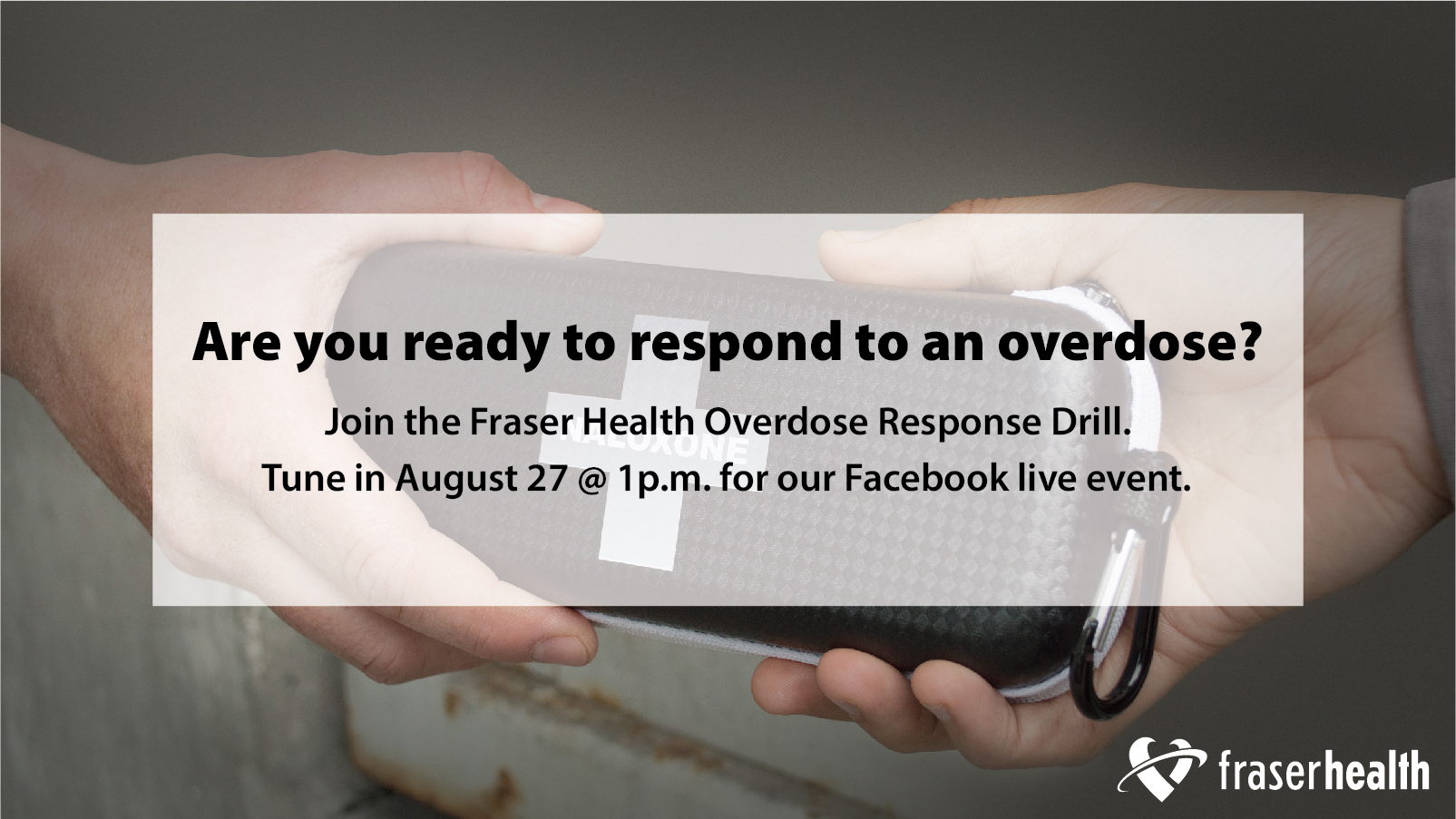
You have the naloxone kit. You feel ready to help if you encounter someone overdosing. But are you?
SURREY – You have the naloxone kit. You feel ready to help if you encounter someone overdosing. But are you? From August 27-31, 2018, Fraser Health is holding Overdose Response Practice Drills to promote being prepared to recognize and respond to a drug overdose. The public is invited to join an online demonstration and live chat session, where experts will answer questions and show how to respond to an overdose, including how to use naloxone.
“We are saving lives by equipping British Columbians with the right tools and the right knowledge to respond to the overdose crisis,” said Minister of Mental Health and Addictions Judy Darcy. “This is another example of the great work happening across B.C. So far, more than 114,170 naloxone kits have been distributed, and training is available in locations across British Columbia including through community pharmacies and online.”
The online demonstration showing how to administer naloxone will be performed via live video on August 27, 2018, at 1 p.m., on Fraser Health’s Facebook page. This will be a learning opportunity for everyone – staff, partners and the general public – and provides a chance to ask questions in real time.
In addition to Fraser Health’s staff conducting Overdose Response Practice Drills at their offices, Fraser Health is also encouraging community partners, emergency health services, and police to practice responding to overdoses as well.
Between April 1, 2016, and June 30, 2018, Fraser Health and contracted agencies have dispensed approximately 26,350 take-home naloxone kits to those at risk of overdose and the people who care about them. Everyone with a naloxone kit should consider reviewing how to use them to sharpen their skills. Toolkits with instructions on how to conduct practice drills will be available on Fraser Health’s Overdose Hub to support everyone interested in maintaining their skills. Fraser Health invites anyone who does not have a take-home naloxone kit – but thinks they may need to intervene – to get one because naloxone saves lives.
“The tragedy of overdose deaths is preventable because overdoses are reversible if they are responded to early enough. Our opioid prevention and response strategy includes the expansion of naloxone availability. Naloxone saves lives by effectively reversing overdoses,” said Dr. Aamir Bharmal, Fraser Health medical health officer. “Even if you have had naloxone training, it is important to refresh those skills on a regular basis through practice and online training.”
Since a provincial public health emergency was declared in April 2016, almost 3,000 people in British Columbia have died from illegal drug overdose. The live online video demonstration and chat starts a week of conversations and drills leading up to International Overdose Awareness Day on August 31, 2018. The event is a global effort to raise awareness about overdose, reduce the stigma of substance-related injury and death, and to acknowledge the grief felt by those who have lost loved ones and community members to overdose.
This campaign is part of Fraser Health’s multi-faceted strategy to address the overdose emergency in the region, which also includes prevention, early intervention, harm reduction and treatment. This announcement supports the work of the Ministry of Mental Health and Addictions to save lives from overdose and connect more people to treatment and recovery. The provincial government has invested $322 million over three years to support the ministry-led, coordinated response to the overdose crisis. These actions are spearheaded by the new Overdose Emergency Response Centre and are focused on saving lives, ending stigma, building treatment and recovery networks, creating a supportive environment, advancing prevention, and improving public safety.
For more information about what Fraser Health is doing to address the overdose emergency, please visit fraserhealth.ca/overdose.
For more information about what the Government of B.C. is doing to address the overdose crisis, please visit StopOverdoseBC.
For more information about overdose response, please go to www.towardtheheart.com.
Media contact
For media inquiries, please contact:
media@fraserhealth.ca


